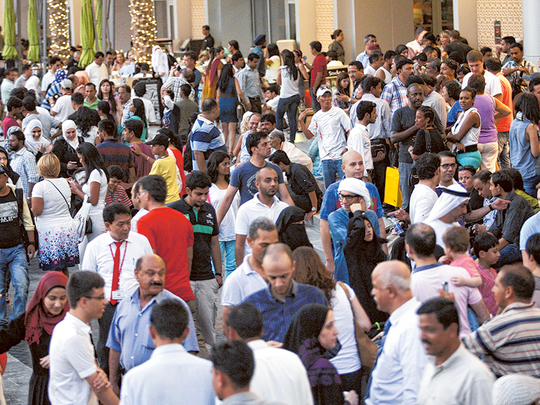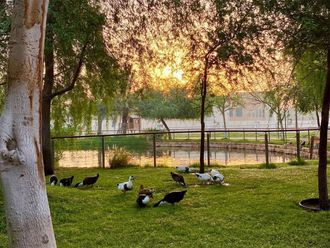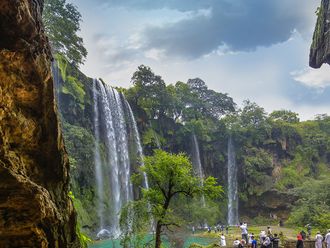
“No matter how many buildings, foundations, schools and hospitals we build, or how many bridges we raise, all these are material entities. The real spirit behind the progress is the human spirit, the able man with his intellect and capabilities.”
- Shaikh Zayed Bin Sultan Al Nahyan, Father of the Nation
In the 46 years of its existence, the UAE has nurtured the diversity of its expatriates with vigour, giving them a free environment in which to thrive and scale their heights of ambition. While the United Nations has 193 member nations, UAE surpasses that number with over 200 nationalities living in it in perfect harmony. Respect for each other’s cultural identity and the common cause of humaneness are among the defining features of the UAE, which has set an example of what it means to enable expatriates and citizens alike to be global citizens.
Tolerance is one of the cornerstones of UAE society and there is no better example of how integral this virtue is to the country’s ethos than the announcement of the Ministry of Tolerance by His Highness Shaikh Mohammad Bin Rashid Al Maktoum, Vice-President and Prime Minister of UAE and Ruler of Dubai, in February this year.
Appointing Cabinet Minister Shaikha Lubna Al Qasimi as Minister of State for Tolerance, Shaikh Mohammad said the new position would have a person who “will instil tolerance as a fundamental value of society”.
Before this, the UAE also promulgated an Anti-Discriminatory Federal law which forbids citizens and residents alike to discriminate against anyone on the grounds of caste, creed, culture or religion.
Gulf News speaks to expatriates, religious heads and diplomats in the UAE about what it means to live in this happy mix.
Shaikh Ali Al Masha’l, Grand Mufti in UAE
The Grand Mufti is appreciative of the Rulers who have preserved this harmony in people.
“Firstly, I thank God for blessing this country with a leadership which cares about its people’s safety and security and exerts extensive efforts in accomplishing peace and spreading cultural awareness, civilised behaviour and proper morals among the public despite the differences in their religions, languages and nationalities. This is a blessing from Allah that deserves gratitude from all those who reside in this country.
“This comfortable and peaceful life is one that we ask Allah to maintain as it signifies a number of things, including the wisdom in the country’s leadership and guidance and the fairness in treatment and good civil behaviour among people. Moreover, the continuous surveillance of all incidents and new happenings as well as the prevention of unfairness, coercion and other hateful actions that inevitably lead to worry, problems and disturbance among people are reasons why the UAE is a country of tolerance.”
Father Lenny Connully, head priest at St Mary’s Parish, Dubai
In awe of the number of nationalities that congregate for church services every week, Father Connully said, “In the six years that I have been in the UAE, I have found this place to be a unique community with so many people from different countries and cultures coming together at one place of worship. What never stops amazing me is that so many strangers come together at our service in perfect love and harmony.”
Father Connully, who hails from India, said the church volunteers often conduct health and education camps for everyone. “People are ready to help each other. This kind of harmony I have seen only in the UAE.”
“I have lived in the UAE for over 40 years and have imbibed the best traditions of happiness and tolerance. There are over 50,000 Sikhs in the community. The UAE government has nurtured mutual respect in everyone. The new law against hatred is an example of the willingness and intent of the government and this is bound to have a strong impact on society,” said Kandhari.
The gurdwara or the Sikh temple in Jebel Ali which opened in 2012 was paid a visit by Shaikh Nahyan Bin Mubarak Al Nahyan, UAE Minister of Culture and Knowledge Development, to send a message of mutual respect and tolerance in society.
“The Sikh Temple at Jebel Ali stands as a symbol of harmony and has become a regular with international tourists and serves at minimum of 1,000 meals free each day at its ‘langar’ (public banquet),” said Kandhari. “On Fridays, especially, when-blue collar workers visit the temple, the langar serves 10,000 free meals.”
The gurdwara holds multifaith talks, has multilanguage priests, celebrates several multireligious festivals and hosts over 40,000 people during such celebrations, including marriages that are solemnised here. “The Sikh community has received so much love and inclusion from the UAE society that we would like to give back to the community. We built the Sikh temple to serve people of all walks of life,” added Kandhari.
Seeking amity on common ground
In the warp and weft of UAE’s social fabric, Indians and Pakistanis, who together comprise a large segment of expatriates, find a harmony that transcends their historic rivalry back home. Affable in each other’s company, the two nationalities find much common ground in the UAE, both at work and in their private lives.
As Dr Faisal Ikram, General Secretary of the Pakistan Association, says: “We might have our differences [back in our respective countries] but in the UAE, we learn to agree to disagree and respect everyone’s viewpoint.”
Dr Ikram feels the UAE is a true global village where every resident learns to co-exist in peace.
Dr Ikram who spent the formative years of his life in Kuwait studying in an Indian school, moved to Pakistan, and then to South Africa where he lived for 17 years. “I have seen apartheid and racial tensions in South Africa but, after coming to UAE, I was able to value the spirit of tolerance and inclusion in everyday life,” said Dr Ikram.
At the monthly health camps help by the Pakistan Association, their team attends to people from countries such as Sri Lanka, Bangladesh and India. “Religion or nationality is not a barrier for us and we serve everyone equally at this health camp and also when we visit labour housing,” said Dr Ikram, who believes such harmony is possible only because the UAE provides an environment of peace and understanding wherein people have learned mutual respect.
Diplomats’ point of view
In the diplomatic arena, where the cohesion of the global community is an overarching goodwill principle that works to create a more tolerant world, the UAE provides a perfect example of how nations can create harmony as a centrifugal force. Diplomatic heads of states representing their country’s interest here in the UAE have also noticed the affable socio-cultural vibes of the country and appreciate it deeply.
Barbara A. Leaf, US Ambassador to the UAE
Praising the UAE’s ability to celebrate diversity, Ambassador Leaf said, “The diversity of the UAE reminds me of home. The UAE has opened its doors to much of the world, and in so doing has created a microcosm of cultures and peoples. Learning to live, work, and grow together as a multicultural society can provide incredible benefits, including a well-spring of knowledge, innovation, and tolerance.”
Paul Raymund Cortes, Consul General of Philippines
The Consul General believes that it would be more appropriate to describe the UAE as a wonderful assorted salad rather than a melting pot. “In a melting pot, qualities [flavours] meld with heat, while the analogy of a salad is more appropriate as many interesting ingredients are tossed together [in a salad] — they can be separately identified but, together, they lend an unmatched flavour. The ethos in this country helps people to celebrate their roots and their identity even while they accommodate the practices and customs of others.”
Cortes feels the diversity enjoyed by UAE society can most certainly serve as a template for the rest of the world to emulate. “The UAE’s emphasis on happiness and tolerance amongst all — no matter how diametrically opposed we might be — goes to prove that people can coexist without conflict. The precedence set by the UAE reflects the hope that [the world too] may be able to live in the spirit of peace and harmony.”








